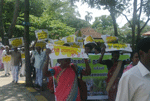Sri Lanka: Ecological agriculture is the way out of poverty
Published on Thu, 2013-02-21 18:42
Experiences of farmer organizations and people’s organizations over the last 15 years show that ecological agriculture is a very effective way of overcoming hunger and poverty and of reducing ill health, and ecological destruction caused by conventional chemical farming. Over a hundred organizations of farmers, fishers, women, plantation workers and industrial workers have struggled in Sri Lanka for a more logical, workable and people friendly approach and strategy for economic improvement, reduction of poverty and hunger and for social justice. Today they are able to present a very workable alternative approach to the economy and development process in the country. It has succeeded in getting the Government to accept some aspects of this strategy at least as election promises. It is a strategy that is relevant to the current world situation and a strategy that can be worked out to a considerable degree, even without active and honest support of government. In Sri Lanka’s situation the most effective way of ending hunger and poverty is by allowing nature to make its maximum contribution to this process. Sri Lanka still has a very large percentage of small farmers who are concerned primarily with producing their food. Thus, they grow rice, main food, vegetables, pulses, yams and potatoes etc. Large numbers of people still live in rural areas. Trying to make the country attractive to foreign investment over the last 36 years has failed and only cost the country a tremendous increase in foreign debt. The governments have declared various programmes for rural small farmers’ agricultural improvement. Programmes such as “Divineguma ’ (livelihood improvement), Gamaneguma (improvement of village), Gemi Diriya (courage of villagers, Api Wawamu Rata Nagamu (let grow and Build the Nation) have all being saying about utilizing the possibilities of rural small holders to grow their own food. However, these programmes have been influenced by agro chemical companies for their interests and thus the programmes are not carried out with a right vision and approach. Governments still continue in the same direction of improving massive infrastructure, building express highways, international airports and harbors, tourist zones etc which have failed to achieve the declared objective of expanding exports attracting foreign investment, achieving faster economic growth, expecting it to trickle down and reduce poverty. This is just to be able to get more and more foreign loans. The burdens of these debts are transferred to the poor while the rich and investors get very large tax holidays. Government has had to spend huge sums of money to provide chemical fertilizer at subsidized prices (about a hundred billion is spent annually on the fertilizer subsidy alone). It has now been found that chemical agriculture leads to severe health problems and death. In Padaviya in the North Central Province around 20,000 people have died of a mysterious kidney disease proved to be caused by arsenic or Cadmium poisoning due to chemical agricultural inputs. Thus, it is definitely necessary and quite possible to transform chemical input dependent agriculture in Sri Lanka into a much more beneficial form of ecological agriculture. Therefore, people’s organizations demand that these plantation people should be given land ownership and they should be assisted and guided to do ecological agriculture. Source: |





